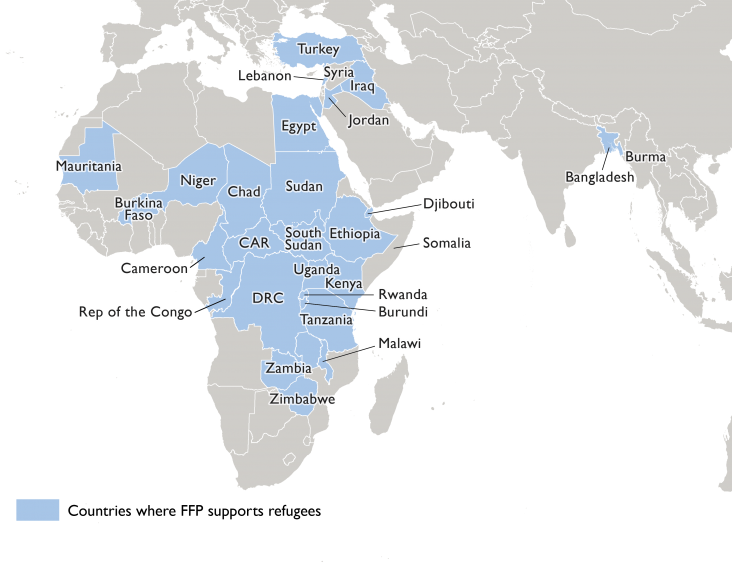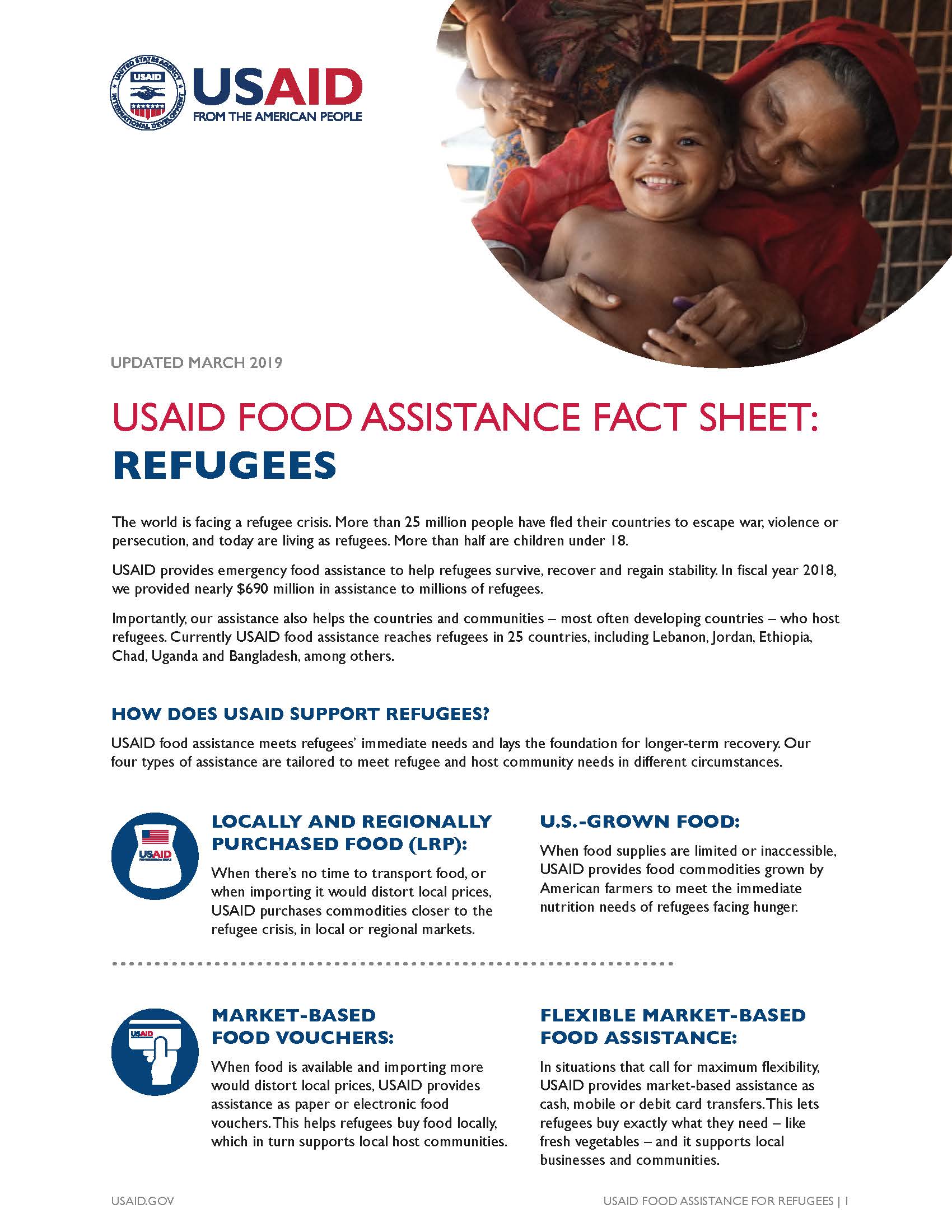- What We Do
- Agriculture and Food Security
- Democracy, Human Rights and Governance
- Economic Growth and Trade
- Education
- Environment and Global Climate Change
- Gender Equality and Women's Empowerment
- Global Health
- Humanitarian Assistance
- Transformation at USAID
- Water and Sanitation
- Working in Crises and Conflict
- U.S. Global Development Lab
Speeches Shim

The world is facing a refugee crisis. More than 25 million people have fled their countries to escape war, violence or persecution, and today are living as refugees. More than half are children under 18.
USAID provides emergency food assistance to help refugees survive, recover and regain stability. In fiscal year 2018, we provided nearly $690 million in assistance to millions of refugees.
Importantly, our assistance also helps the countries and communities – most often developing countries – who host refugees. Currently USAID food assistance reaches refugees in 25 countries, including Lebanon, Jordan, Ethiopia, Chad, Uganda and Bangladesh, among others.

Food Assistance Fact Sheet - Supporting Refugees ![]() (pdf - 6 MB)
(pdf - 6 MB)
How Does USAID Support Refugees?
USAID food assistance meets refugees’ immediate needs and lays the foundation for longer-term recovery. Our four types of assistance are tailored to meet refugee and host community needs in different circumstances.
- LOCALLY AND REGIONALLY PURCHASED FOOD (LRP): When there’s no time to transport food, or when importing it would distort local prices, USAID purchases commodities closer to the refugee crisis, in local or regional markets.
- U.S.-GROWN FOOD: When food supplies are limited or inaccessible, USAID provides food commodities grown by American farmers to meet the immediate nutrition needs of refugees facing hunger.
- MARKET-BASED FOOD VOUCHERS: When food is available and importing more would distort local prices, USAID provides assistance as paper or electronic food vouchers. This helps refugees buy food locally, which in turn supports local host communities.
- FLEXIBLE MARKET-BASED FOOD ASSISTANCE: In situations that call for maximum flexibility, USAID provides market-based assistance as cash, mobile or debit card transfers. This lets refugees buy exactly what they need – like fresh vegetables – and it supports local businesses and communities.
ROHINGYA REFUGEES IN BANGLADESH: USAID provided nearly $108 million in food assistance to help Rohingya refugees who fled Burma to seek safety across the border in Bangladesh.
FOOD VOUCHERS FOR SYRIAN REFUGEES: USAID provided food vouchers reaching 1 million Syrian refugees in Jordan, Lebanon, Egypt, Iraq and Turkey, helping them buy food in local markets, which in turn helps the local economies that host them.
FOOD ASSISTANCE IN ETHIOPIA: USAID provided refugees with $45 million in food aid, including yellow split peas or lentils, vegetable oil and sorghum, as well as supplementary nutrition products for young children and pregnant or breastfeeding women.
REFUGEES IN UGANDA: USAID provided more than 1 million refugees and asylum-seekers in Uganda with emergency food assistance, including U.S.-grown and locally and regionally grown food.
Refugees, Conflict and Instability
Refugees are people who have fled their homes for safety, and they are scattered across the world. More than half of refugees come from countries mired in conflict, notably Syria and South Sudan. In places like Somalia, natural disasters exacerbate population movements and humanitarian needs.
More than 80 percent of the world’s refugees today live in developing countries. Turkey alone hosts more than 3 million refugees; Pakistan and Uganda each more than 1 million; and Bangladesh hosts nearly 1 million Rohingya refugees from Burma.
Related Resources
- Emergency Food Assistance
- Types of Emergency Food Assistance
- Video: What U.S. Food Assistance Means to Refugees
- StoryMap: What U.S. Food Assistance Means to Refugees
- Innovation Comes to Uganda Refugee Settlements
- Together It is Possible: Feeding the World's Largest Refugee Camp
- Emergency Food Rations Save Lives of Congolese Refugees
- Refugees in Kenya: Mega-Camps Develop Mini Economy for Growing Grains
- U.S. Food Assistance Renews Optimism for Refugees in Djibouti


Comment
Make a general inquiry or suggest an improvement.